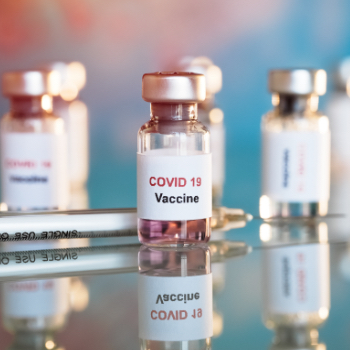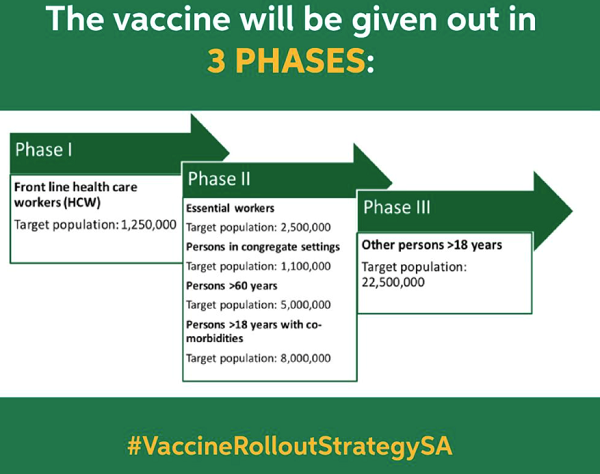Understanding SA's vaccine rollout plan: Where do you fit into the #VaccineRolloutStrategySA?

In his 11 January National Address, President Cyril Ramaphosa made it clear that South Africa, like other countries the world over, will be undertaking a massive COVID-19 vaccination programme.
"Vaccines offer to the peoples of the world a means to control the coronavirus pandemic. A person who is vaccinated has a much-reduced chance of becoming ill and dying from COVID-19," explained President Cyril Ramaphosa.
"When enough people are vaccinated, we will reach what is known as 'herd immunity' or 'population immunity'. This is when a significant number of people of the population have developed immunity against the virus to provide indirect protection to those who aren't immune, bringing the spread of the virus under control. While the actual level needed for herd immunity is not known, our scientists estimate that we will likely reach herd immunity once around 67% of our population are immune. This amounts to around 40 million people in South Africa."
- Read the latest letters "From the desk of the President" in which we are updated regularly on the country's national vaccine rollout programme.
Which vaccines will be available in South Africa?
To date, several COVID-19 vaccines have published evidence from phase-three clinical trials and received approval for emergency use in many countries. These include the Johnson & Johnson, Pfizer-BioNTech, Moderna and Oxford-AstraZeneca vaccines.
- South Africa received its first batch of vaccines - one million Oxford-AstraZeneca vaccines - on 1 February. This vaccine was bought by our government as it showed an average of 75% efficacy against the strain of COVID-19 prevalent during the first wave of infections, in 2020.
- Unfortunately, new trial data (made public on 7 February) from the South African arm of the Astra-Zeneca vaccine trial of 2000 participants showed only a 22% efficacy against mild to moderate COVID-19 disease with data not yet available to assess efficacy against severe disease. This resulted in the government halting the roll-out of the Astra-Zeneca vaccine while awaiting more clinical efficacy data.
- At the same time, the results of the Johnson & Johnson vaccine trial were also released and they showed a slightly reduced efficacy in protecting against mild-to moderate disease dropping from 72% to 64% but showed an 82% efficacy in protecting against severe disease. A 100% protection against death was also reported.
- The South African Government guided by the Ministry of Health therefore decided to initiate a roll-out plan starting with healthcare workers with the Johnson and Johnson single dose vaccine under a clinical trial setting while awaiting SAHPRA approval for the formal roll-out. This was initiated on 17 February 2021.
- South Africa has also secured 9 million vaccine doses from Johnson & Johnson and 20 million doses from Pfizer Inc., which are expected to arrive from May and June respectively.
- South Africa is also in negotiations to acquire the Russian Sputnik vaccine (interim Phase 3 study results show 91% efficacy, 21 days after the first dose of vaccine), the Chinese Sinopharm vaccine, the US Moderna vaccine and will explore acquiring the Novavax vaccine Phase 3 clinical trials show 89.3% efficacy against the new British variant of the COVID-19 virus. In the South Africa Phase 2b clinical trial, 60% efficacy (95% CI: 19.9 - 80.1) for the prevention of mild, moderate and severe COVID-19 disease was observed in the 94% of the study population that was HIV-negative.
More information on the Department of Health's roll out plan is available in the FAQs document compiled by Sisonke, the SAMRC and the National Department of Health.
What are key considerations in the selection of COVID-19 vaccines for South Africans?
"There are six key considerations in our government's selection of vaccines for people in South Africa," explains Dr Nematswerani.
The key considerations are:
- The availability of a particular vaccine
- The safety, efficacy and quality of the vaccine as assessed by the South African Health Products Regulatory Authority (SAHPRA)
- The ease of use and schedule (including the number of doses needed)
- The stability of the vaccine during storage and distribution
- The supply of the vaccine and sustainability of this supply
- The cost of the vaccine
What steps need to be followed before a COVID-19 vaccine is rolled out?
Watch this 1-minute sacoronavirus.co.za video to find out more.
Which regulatory body considers the safety of and approves the use of the vaccines in South Africa?
The South African Health Products Regulatory Authority (SAHPRA) must approve all vaccines before they can be used in South Africa.
Who will coordinate the COVID-19 vaccine roll-out strategy in South Africa?
Our government will source, distribute and oversee the rollout of the COVID-19 vaccination strategy. Government is the sole purchaser of vaccines and will distribute them to provincial governments and the private sector. A national register for COVID-19 vaccinations will also be established. All those vaccinated will be placed on a national register and given a vaccination card. A national roll-out committee will oversee the vaccinations in both the public and private sectors.

Achieving population immunity in South Africa with the help of COVID-19 vaccines
"By the end of phase three it is expected that 40 million South Africans (representing 67% of the population) will have been vaccinated," explains Dr Nematswerani. "At this level of vaccine penetration, we hope to achieve population immunity."
What does population immunity mean?
Population immunity is reached when a large proportion of the population develops immunity to a disease, like COVID-19. This makes the spread of this disease from person to person unlikely and gives indirect protection against COVID-19 to people who are not immune to the disease.
According to the World Health Organization (WHO), population immunity , is the indirect protection from an infectious disease that happens when a population is immune - either through vaccination or immunity developed through previous infection.
The WHO advises that population immunity against COVID-19 should be achieved by protecting people through vaccination, not by exposing them to the virus that causes the disease.

